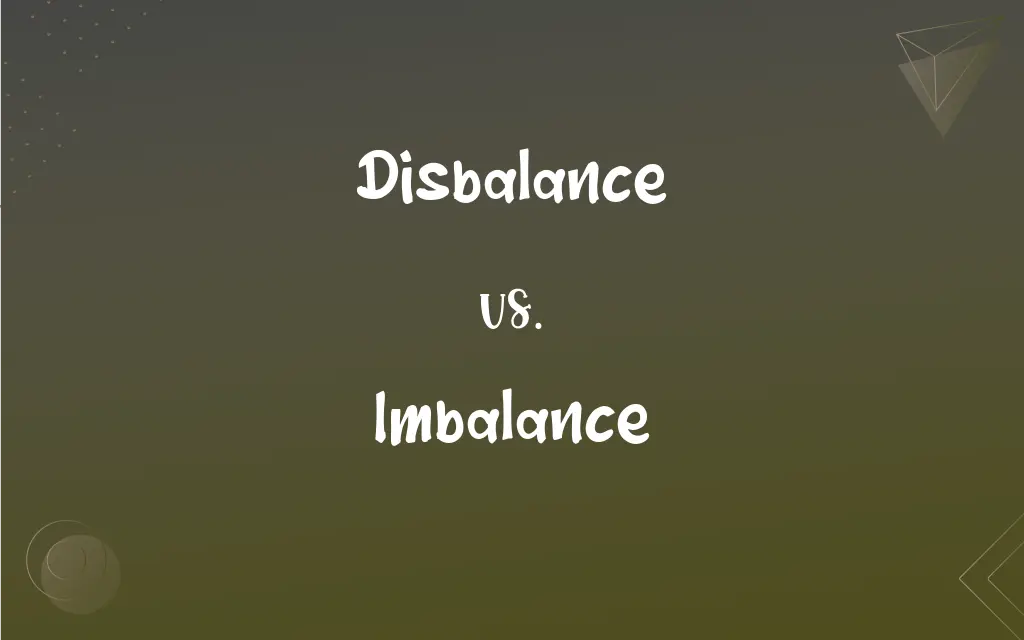Disbalance vs. Imbalance: What's the Difference?
By Janet White & Harlon Moss || Updated on May 23, 2024
Disbalance refers to a lack of balance, often in a specific context, while imbalance indicates a more general state of unevenness or disproportion.

Key Differences
Disbalance refers to a situation where balance is lost, typically in a specific context or system. It is less commonly used than "imbalance" and often implies a disruption in equilibrium that can be corrected. Imbalance, on the other hand, denotes a general state of disproportion or lack of equality, commonly used in broader contexts such as economic imbalance or imbalance in power.
Disbalance is frequently applied in specialized fields, such as engineering or mechanics, where precision and specific corrections are necessary. For example, a disbalance in a rotating machine part requires immediate adjustment. Imbalance is more versatile, appearing in everyday language to describe various forms of inequality or disproportion, like an imbalance in a diet or hormonal imbalance.
In terms of severity, disbalance might suggest a temporary or correctable issue, whereas imbalance can imply a more persistent or systemic problem. For instance, a minor disbalance in a financial account could be quickly fixed, while an economic imbalance might require extensive policy changes.
Disbalance, though technically correct, is less prevalent in modern usage compared to imbalance. This can affect how they are perceived and understood by the general audience. Imbalance is more widely recognized and understood, making it the preferred term in most contexts.
The nuances between these terms are subtle but significant in professional and technical writing. Using "disbalance" might be appropriate for specific technical scenarios, whereas "imbalance" serves well in both professional and general communication to indicate unevenness or inequality.
ADVERTISEMENT
Comparison Chart
Common Usage
Less common, specific contexts
More common, general contexts
Connotation
Often implies a correctable issue
Suggests a more persistent problem
Application
Technical fields (engineering, mechanics)
Everyday language, broad contexts
Prevalence
Less prevalent in modern usage
Widely recognized and understood
Examples
Disbalance in a machine part
Economic imbalance, hormonal imbalance
ADVERTISEMENT
Disbalance and Imbalance Definitions
Disbalance
Temporary loss of balance.
The disbalance was quickly corrected by the technician.
Imbalance
Lack of symmetry or proportion.
The imbalance in workload caused stress among employees.
Disbalance
A specific type of imbalance.
Engineers noticed a disbalance in the rotor’s alignment.
Imbalance
General state of unevenness.
The imbalance in the economy was concerning.
Disbalance
Unusual term for imbalance.
Disbalance in the data was evident during the analysis.
Imbalance
A state of disproportion or inequality.
The diet had an imbalance of nutrients.
Disbalance
Lack of balance in a system.
The disbalance in the machinery caused vibrations.
Imbalance
Persistent or systemic unevenness.
Hormonal imbalance can affect mood and health.
Disbalance
Disruption in equilibrium.
The sudden disbalance affected the system’s efficiency.
Imbalance
Uneven distribution.
There was a clear imbalance in the demographic data.
Disbalance
A lack of balance, imbalance.
Imbalance
A lack of balance, as in distribution or functioning.
Disbalance
To cause to be unbalanced.
Imbalance
The property of not being in balance.
The growing imbalances between the rich and poor first lead to more crime.
Imbalance
A state of disequilibrium (as may occur in cases of inner ear disease)
Imbalance
(mathematics) a lack of symmetry
FAQs
What is the difference between disbalance and imbalance?
Disbalance is a less common term referring to a specific loss of balance, while imbalance is more general and widely used to describe disproportion or inequality.
Can disbalance and imbalance be used interchangeably?
They can be used interchangeably in some contexts, but imbalance is more universally understood.
Is imbalance always negative?
Imbalance usually indicates a negative condition, such as inequality or disproportion.
In what contexts is disbalance used?
Disbalance is often used in technical fields like engineering and mechanics.
Why is imbalance more common than disbalance?
Imbalance is more versatile and applicable to a wide range of contexts, making it more prevalent in everyday language.
Can disbalance be corrected easily?
Disbalance often suggests a correctable issue, especially in technical contexts.
Is disbalance commonly used?
No, disbalance is less common and typically used in specific technical contexts.
Does disbalance suggest a temporary issue?
Yes, disbalance often implies a correctable problem in a specific system.
Is imbalance used in medical terms?
Yes, imbalance is commonly used to describe medical conditions, like hormonal imbalance.
Does imbalance imply a long-term issue?
It can imply a long-term or systemic problem.
What is a practical example of imbalance?
An imbalance in trade between two countries.
Can imbalance be positive?
Typically, imbalance has a negative connotation.
Can imbalance describe social issues?
Yes, imbalance is often used to describe social and economic issues.
Does disbalance refer to physical balance only?
Not exclusively, but it is often used in physical or mechanical contexts.
Which term is more formal, disbalance or imbalance?
Imbalance is more formal and widely recognized in both professional and general contexts.
Is disbalance used in everyday conversation?
Rarely, imbalance is more commonly used.
Are there synonyms for disbalance?
Imbalance is often used as a synonym for disbalance.
Are there synonyms for imbalance?
Yes, disproportion and inequality can be synonyms for imbalance.
Is disbalance recognized in dictionaries?
Disbalance is recognized but less commonly listed compared to imbalance.
What is a practical example of disbalance?
A disbalance in a spinning wheel causing it to wobble.
About Author
Written by
Janet WhiteJanet White has been an esteemed writer and blogger for Difference Wiki. Holding a Master's degree in Science and Medical Journalism from the prestigious Boston University, she has consistently demonstrated her expertise and passion for her field. When she's not immersed in her work, Janet relishes her time exercising, delving into a good book, and cherishing moments with friends and family.
Co-written by
Harlon MossHarlon is a seasoned quality moderator and accomplished content writer for Difference Wiki. An alumnus of the prestigious University of California, he earned his degree in Computer Science. Leveraging his academic background, Harlon brings a meticulous and informed perspective to his work, ensuring content accuracy and excellence.































































